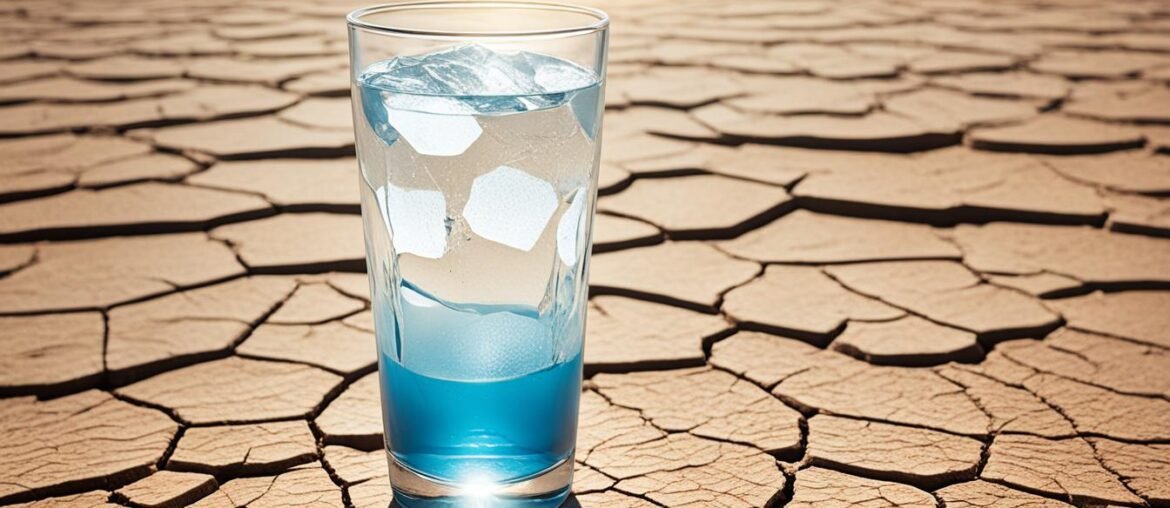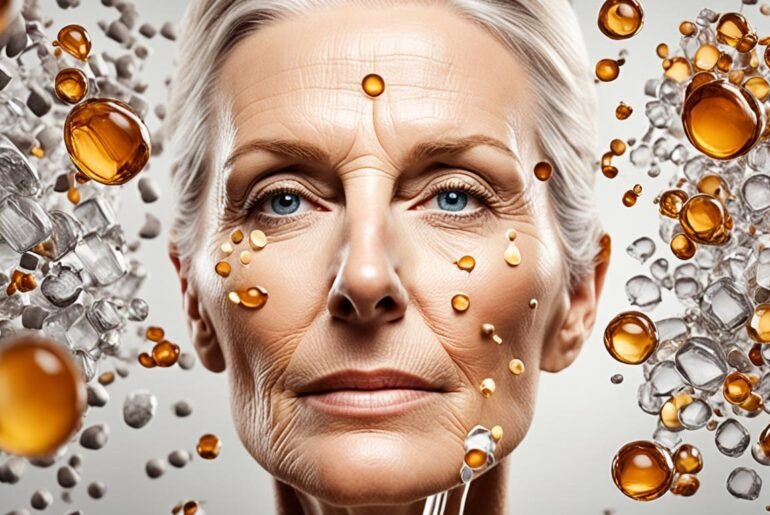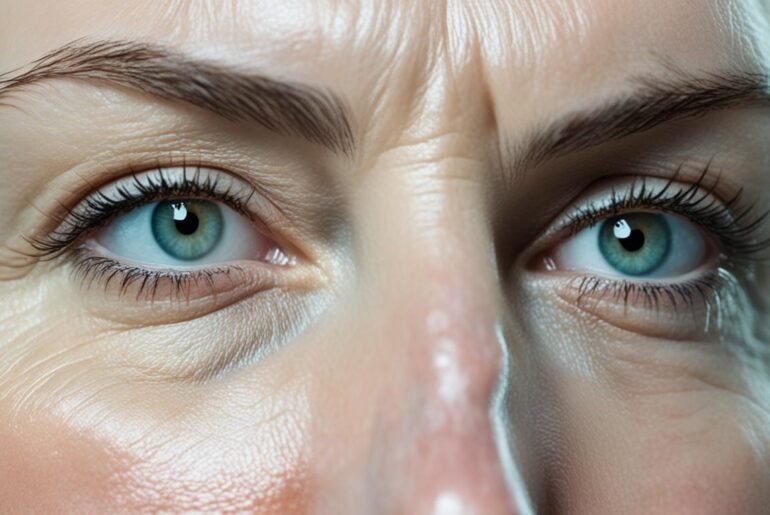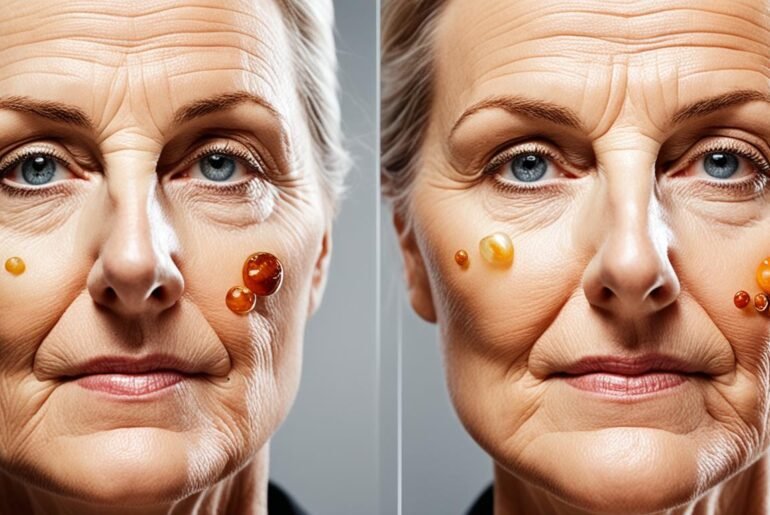Did you know that alcohol consumption can have a drastic impact on the health and appearance of your skin? It’s true! According to nutritionist Jairo Rodriguez, alcohol is one of the worst compounds for the skin, causing visible dehydration and wrinkles. Not only does alcohol deplete the skin of fluids, leading to dryness and wrinkles, but it also inflames the tissue, resulting in redness and flushing.
If you’re worried about alcohol’s effects on your skin, it’s essential to be aware of the risks and take proactive steps to mitigate them. In this article, I will discuss the various ways in which alcohol can impact your skin, from dehydration to accelerated aging. I will also provide expert advice on how to reduce the negative effects and maintain healthy, youthful-looking skin.
Key Takeaways:
- Alcohol dehydrates the skin and leads to visible signs of dehydration and wrinkles.
- Excessive alcohol consumption can exacerbate skin conditions such as rosacea and psoriasis.
- Alcohol accelerates the aging process by decreasing collagen production in the skin.
- Alcohol can interfere with the skin’s absorption of vital nutrients, leading to dullness.
- Alcohol increases oil production, which can result in acne breakouts.
The Effects of Alcohol on the Skin
Alcohol can have detrimental effects on the skin, causing dehydration, inflammation, and accelerated aging. When consumed, alcohol depletes the skin of essential fluids, leading to visible dehydration and increased appearance of wrinkles. Additionally, alcohol triggers an inflammatory response in the body, resulting in redness and flushing of the skin.
Excessive alcohol consumption can disrupt sleep patterns, leading to a duller complexion and the formation of more wrinkles. Lack of proper sleep can hinder the skin’s ability to repair and rejuvenate itself, contributing to premature aging.
It is important to note that alcohol can worsen underlying skin conditions such as rosacea and psoriasis. The inflammatory properties of alcohol can aggravate these conditions, leading to increased redness, irritation, and flare-ups.
“Alcohol dehydrates the skin, causing visible signs of dehydration, wrinkles, and inflammation.” – Jairo Rodriguez, Nutritionist
Furthermore, alcohol can interfere with the absorption of essential nutrients, such as vitamin A, which is vital for maintaining healthy and radiant skin. This can result in dullness and a lack of vibrancy in the complexion.
Managing alcohol consumption and making lifestyle changes can help mitigate the negative effects of alcohol on the skin. By reducing alcohol intake, staying hydrated, and adopting a healthy skincare routine, individuals can promote healthier, youthful-looking skin.
Comparing the Effects of Alcohol on the Skin
| Effects of Alcohol | Description |
|---|---|
| Dehydration | Alcohol depletes the skin of essential fluids, leading to visible dehydration and increased appearance of wrinkles. |
| Inflammation | Alcohol triggers an inflammatory response in the body, resulting in redness, flushing, and increased irritation. |
| Poor Sleep Quality | Excessive alcohol consumption disrupts sleep patterns, leading to a duller complexion and the formation of more wrinkles. |
| Aggravation of Skin Conditions | Alcohol can worsen underlying skin conditions such as rosacea and psoriasis, leading to increased redness and irritation. |
| Impaired Nutrient Absorption | Alcohol interferes with the absorption of essential nutrients like vitamin A, resulting in dull and lackluster skin. |
Dehydration and Skin Aging
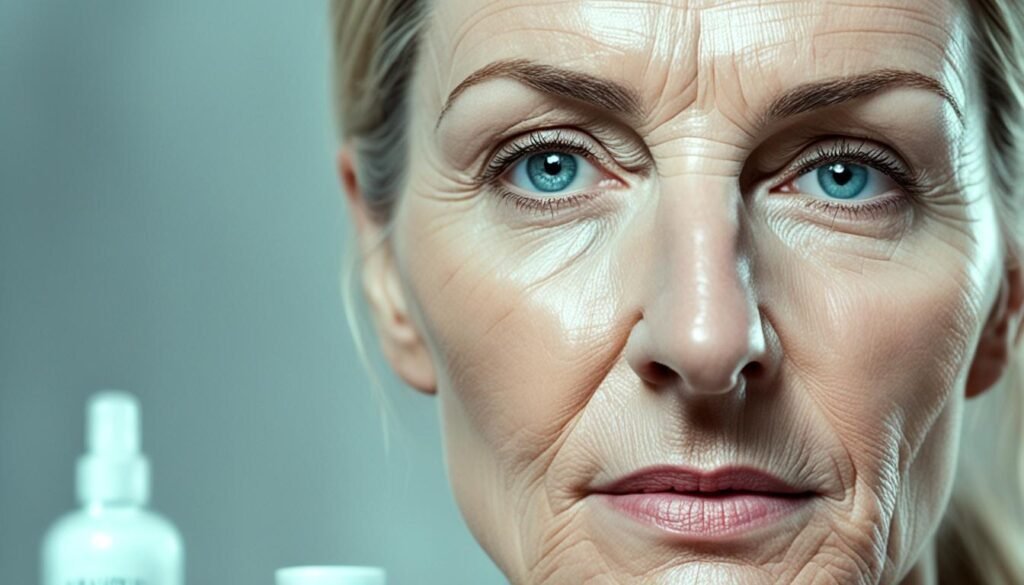
Alcohol consumption can have significant effects on the skin, including alcohol-induced skin dehydration. Alcohol is a diuretic, causing the body to lose more water and salt than usual. This dehydration can lead to various negative consequences for the skin, such as dryness, decreased elasticity, and dry lips.
When the skin becomes dehydrated, it loses its natural moisture and protective barrier, making it more prone to damage and aging. The lack of hydration can result in a dull complexion, fine lines, and wrinkles.
Preventing alcohol-induced skin aging starts with maintaining proper hydration. It is crucial to drink water in between alcoholic drinks to counteract the dehydrating effects of alcohol. Staying hydrated can help the skin retain moisture and maintain its elasticity, giving it a healthier and more youthful appearance.
Furthermore, incorporating practices that promote skin hydration and health can also be beneficial. Using moisturizers, especially those with ingredients like hyaluronic acid and ceramides, can help replenish lost moisture and enhance skin hydration. Additionally, limiting alcohol consumption and practicing a balanced lifestyle can contribute to preventing alcohol-induced skin aging.
“Proper hydration is essential for maintaining healthy and vibrant skin. By taking steps to prevent alcohol-induced skin dehydration, individuals can promote skin health and slow down the aging process.”
| Effects of Alcohol-Induced Skin Dehydration | Methods to Prevent Alcohol-Induced Skin Aging |
|---|---|
|
|
Collagen Depletion and Aging
Alcohol consumption can have detrimental effects on the skin’s elasticity and accelerate the aging process. Collagen, a vital protein responsible for maintaining the structural integrity of the skin, is significantly affected by alcohol consumption. When collagen production decreases, the skin becomes more prone to developing wrinkles, sagging, and an overall older appearance.
Reversing the signs of skin aging caused by alcohol can be challenging once collagen has been depleted. However, there are measures that can help enhance skin elasticity and mitigate the effects of alcohol on the skin. Implementing a skincare routine focused on collagen-stimulating ingredients, such as peptides and retinol, can promote collagen synthesis and improve skin elasticity.
In addition to topical treatments, maintaining a healthy lifestyle is crucial for improving skin elasticity. Consuming a balanced diet rich in fruits and vegetables provides essential vitamins and minerals that support collagen production. Regular exercise also aids in maintaining and improving skin elasticity.
Moreover, protecting the skin from harmful UV rays by wearing sunscreen and avoiding excessive sun exposure can help preserve collagen levels and prevent further damage.
The Importance of Hydration
Hydration is paramount in maintaining skin elasticity and counteracting the effects of alcohol-induced collagen depletion. Drinking an adequate amount of water throughout the day helps replenish lost fluids, keeping the skin hydrated and plump. Combining alcohol consumption with sufficient water intake can assist in minimizing the negative impact on skin elasticity.
To further enhance hydration, incorporating hyaluronic acid into the skincare routine can provide an extra boost of moisture to the skin. Hyaluronic acid acts as a humectant, attracting and retaining water within the skin, promoting a hydrated and more elastic complexion.
| Methods to Improve Skin Elasticity | Benefits |
|---|---|
| Use collagen-stimulating skincare products | Enhances collagen synthesis and improves skin elasticity |
| Consume a balanced diet | Provides essential nutrients for collagen production |
| Stay hydrated | Maintains skin hydration and elasticity |
| Protect the skin from UV rays | Preserves collagen levels and prevents further damage |
| Incorporate hyaluronic acid into skincare routine | Provides additional moisture and enhances skin elasticity |
“Improving skin elasticity requires a comprehensive approach that addresses the underlying factors contributing to collagen depletion. By implementing collagen-stimulating skincare products, following a balanced diet, staying hydrated, and protecting the skin from UV damage, it is possible to reverse the signs of skin aging caused by alcohol and promote a more youthful and elastic complexion.”
While reversing the signs of skin aging caused by alcohol may require time and dedication, the benefits of improving skin elasticity extend beyond a more youthful appearance. By prioritizing skincare and making mindful choices, individuals can counteract the effects of alcohol on the skin and maintain healthy, resilient skin.
Dullness and Skin Absorption
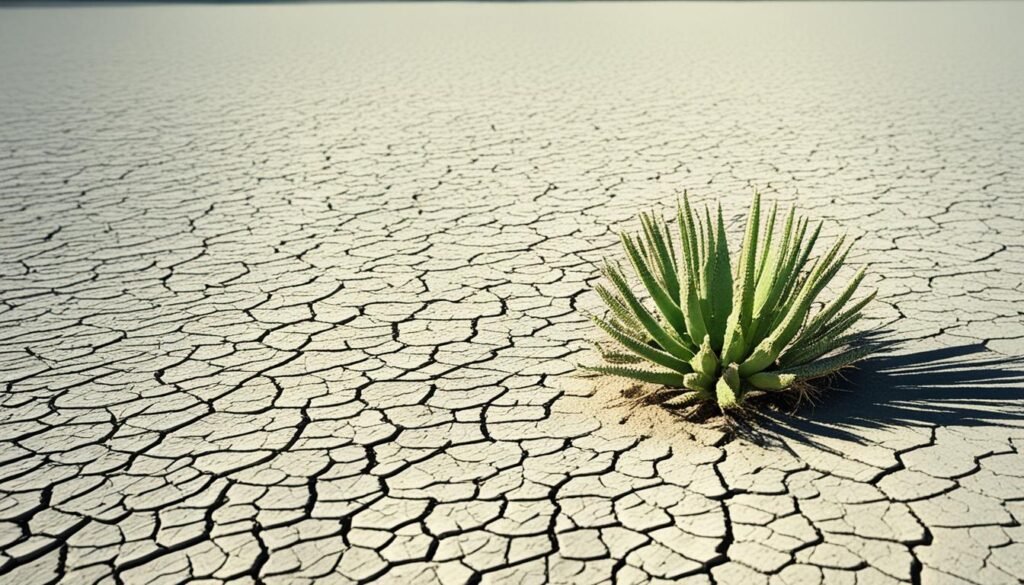
Alcohol’s effects go beyond dehydration and inflammation; they also extend to dullness and the skin’s ability to absorb essential nutrients like vitamin A. Vitamin A is known for its role in maintaining healthy and radiant skin. However, alcohol can interfere with the skin’s ability to absorb this vital nutrient, leading to dullness and a lack of radiance in the complexion.
When alcohol disrupts the absorption of vitamin A, it deprives the skin of an essential element for its rejuvenation and regeneration. This interference can result in a dull and lackluster appearance, robbing the skin of its natural glow. To maintain healthy skin and prevent dullness, it is crucial to moderate alcohol consumption or consider avoiding it altogether.
The Importance of Vitamin A
Vitamin A plays a crucial role in skin health and appearance. It promotes cell turnover, helps maintain the skin’s barrier function, and supports the production of collagen and elastin. These structural proteins contribute to the skin’s firmness, elasticity, and overall youthfulness.
Additionally, vitamin A has antioxidant properties, protecting the skin against free radicals that can cause premature aging and damage. It also aids in reducing hyperpigmentation, improving skin tone, and minimizing the appearance of fine lines and wrinkles.
However, alcohol’s interference with vitamin A absorption can compromise these benefits and lead to a lackluster complexion. By prioritizing the skin’s health and wellbeing, individuals can make choices that preserve and enhance their natural radiance.
“Moderating alcohol consumption is not only beneficial for hydration and inflammation but also plays a crucial role in maintaining a healthy and radiant complexion. By reducing alcohol intake, individuals can support their skin’s ability to absorb essential nutrients, such as vitamin A, and promote a youthful and glowing appearance.” – Nutritionist Sarah Thompson
Choosing Healthy Alternatives
To overcome the effects of alcohol on skin dullness, it’s important to prioritize hydration and nourishment. Opting for non-alcoholic beverages that are rich in skin-friendly nutrients can provide an excellent alternative. For example, consuming antioxidant-rich green tea or hydrating coconut water can replenish the skin’s moisture levels and enhance its natural radiance.
Taking Care from Within
While external skincare products can help improve skin dullness to some extent, true radiance starts from within. In addition to avoiding excessive alcohol consumption, individuals can support their skin’s health by adopting a nutrient-rich diet. Including foods rich in vitamin A, such as sweet potatoes, spinach, carrots, and liver, can help provide the necessary building blocks for vibrant and glowing skin.
| Effects of Alcohol on Skin Dullness | Preventive Measures |
|---|---|
| Interferes with vitamin A absorption | Limit or avoid alcohol |
| Leads to dull and lackluster complexion | Stay hydrated and prioritize skin-friendly beverages |
| Reduces skin’s natural radiance | Incorporate vitamin A-rich foods into the diet |
Acne and Oil Production
Excessive alcohol consumption can have negative effects on the skin, including increased oil production and the development of acne breakouts. When alcohol is consumed, it affects the body’s hormone levels, leading to an increase in oil production in the skin. This excess sebum, combined with dead skin cells, dirt, and bacteria, can clog the pores and result in the formation of blackheads, whiteheads, and pimples.
To prevent alcohol-induced acne, it is essential to limit alcohol intake and practice good skincare habits. Maintaining a balanced diet, staying hydrated, and following a regular skincare routine can help minimize the risk of acne breakouts. Additionally, using non-comedogenic skincare products and avoiding excessive oil-based cosmetics can further reduce the chances of developing acne.
Incorporating these preventive measures into your daily routine can help maintain clear and healthy skin. Remember, individual responses to alcohol and skincare may vary, so it’s always best to consult with a dermatologist for personalized advice and treatment.
| Factors | Effects |
|---|---|
| Alcohol consumption | Increases oil production |
| Excess sebum and debris | Clog pores and lead to acne formation |
| Limiting alcohol intake | Prevents alcohol-induced acne |
Blood Vessel Dilation and Redness
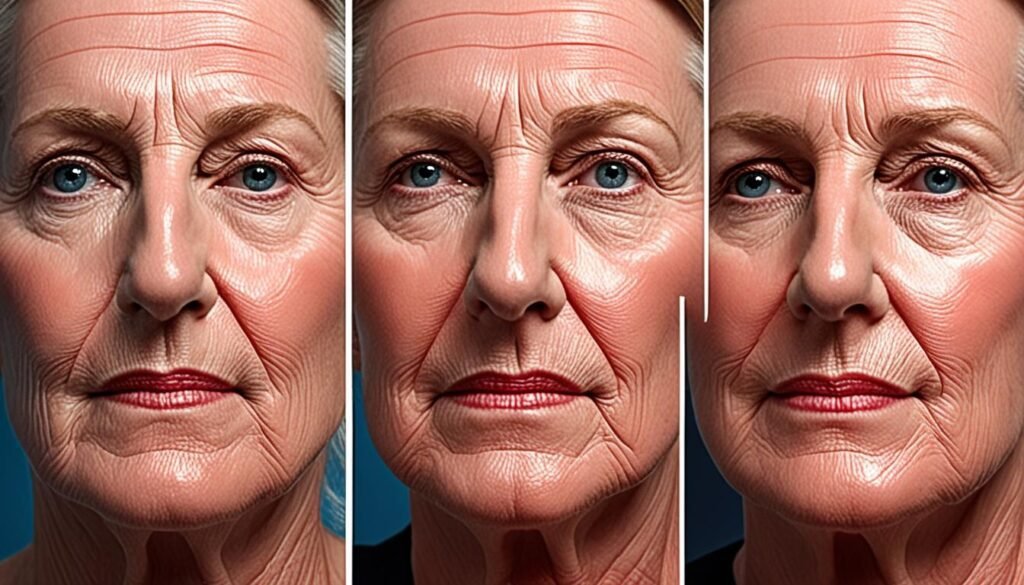
Excessive alcohol consumption can have detrimental effects on blood vessels, leading to redness and flushing of the skin. When alcohol is consumed, it causes blood vessels to dilate, resulting in increased blood flow to the skin’s surface. This dilation of blood vessels can cause a visible reddening of the skin, commonly known as alcohol-induced redness or flushing.
In addition to redness, prolonged and excessive alcohol consumption can also contribute to the development of spider veins or broken capillaries. These are most commonly seen in areas such as the cheeks, nose, and mouth where blood vessels are more prominent. The increased pressure and dilation of the blood vessels can lead to their weakening and potential rupture, resulting in the appearance of these visible blood vessels.
Reducing or eliminating alcohol consumption can help mitigate these effects on blood vessels and minimize the occurrence of redness and flushing. By adopting healthier lifestyle choices, individuals can maintain healthier-looking skin and prevent the development of other alcohol-induced skin concerns.
Preventing Alcohol-Induced Redness and Flushing
To minimize alcohol’s effects on blood vessels and reduce redness and flushing, individuals should consider the following:
- Limiting alcohol consumption: Moderation is key. Avoid excessive drinking and opt for non-alcoholic alternatives when possible.
- Staying hydrated: Drinking plenty of water can help maintain skin hydration and support overall skin health.
- Protecting the skin: Using sunscreen and wearing protective clothing can reduce the risk of sunburn and further damage to blood vessels.
- Seeking professional advice: Consulting with a dermatologist or healthcare professional can provide personalized guidance on managing alcohol-induced skin concerns.
By prioritizing skin health and making conscious choices regarding alcohol consumption, individuals can minimize the occurrence of blood vessel dilation, redness, and flushing, promoting a healthier complexion overall.
| Alcohol’s Effects on Blood Vessels | Prevention Tips |
|---|---|
| Dilation of blood vessels | Limiting alcohol consumption |
| Redness and flushing of the skin | Staying hydrated |
| Development of spider veins or broken capillaries | Protecting the skin |
Sugar Spikes and Wrinkles
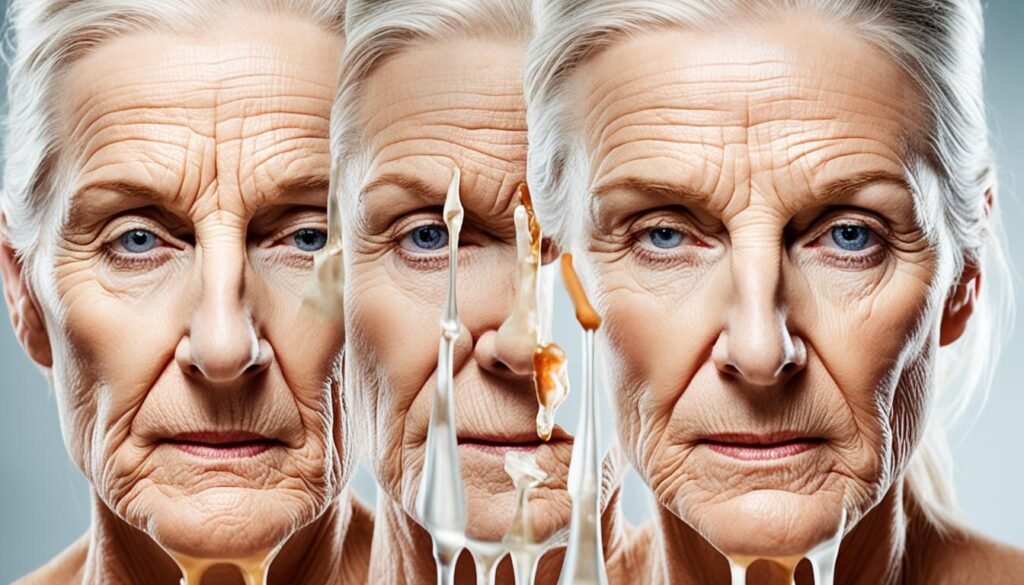
Excessive sugar consumption is not only harmful to our overall health but can also impact the appearance of our skin. When it comes to alcoholic drinks, many of them contain high amounts of sugar, which can have detrimental effects on our skin’s health and contribute to the development of wrinkles.
Sugar consumption can lead to spikes in insulin levels, as our bodies try to regulate the increased sugar intake. High insulin levels, in turn, can contribute to the breakdown of collagen in the skin. Collagen is a protein responsible for maintaining the skin’s elasticity and smoothness. When collagen production is compromised, the skin becomes more prone to developing wrinkles and sagging.
Limiting sugar intake, especially through moderating alcohol consumption, can help prevent premature skin aging and maintain a youthful appearance.
By being mindful of the sugar content in alcoholic beverages and making conscious choices to reduce sugar consumption, we can support the health and vitality of our skin.
The Relationship Between Sugar and Wrinkles
“Excessive sugar consumption can lead to the formation of advanced glycation end products (AGEs) in the body. AGEs are harmful compounds that contribute to the breakdown of collagen and elastin in the skin, resulting in wrinkles and loss of firmness.” – Dr. Sarah Thompson, Dermatologist
Other Negative Effects of Alcohol on the Skin
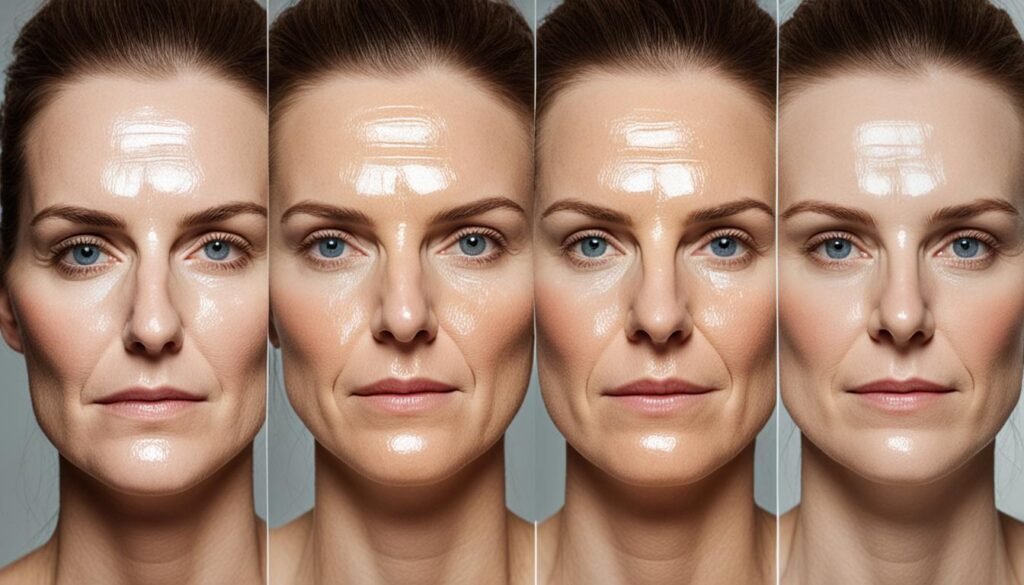
Alcohol consumption can have detrimental effects on the skin beyond dehydration and aging. It can exacerbate various skin disorders and increase the risk of developing alcohol-related skin diseases. Some of the most common conditions associated with alcohol consumption include:
- Flushing: Alcohol can cause facial flushing, a temporary redness and heat sensation in the face due to blood vessel dilation.
- Rosacea: Alcohol is a well-known trigger for rosacea, a chronic skin condition characterized by facial redness, visible blood vessels, and sometimes pimples.
- Psoriasis: Alcohol consumption can worsen psoriasis, an autoimmune disease that causes red, scaly patches on the skin.
- Seborrheic Dermatitis: Alcohol can exacerbate seborrheic dermatitis, a common condition that causes inflammatory skin reactions, such as redness, scaling, and itching.
In addition to these skin disorders, alcohol can also weaken the immune system and make the skin more susceptible to infections and diseases. It can compromise the skin’s natural barrier function, leaving it vulnerable to harmful bacteria and viruses. The risk of sunburn is also increased due to alcohol’s dehydrating effect on the skin. Protecting the skin with sunscreen and avoiding excessive sun exposure is crucial.
To illustrate the negative effects of alcohol on the skin, refer to the following table:
| Alcohol-Related Skin Disorders | Description |
|---|---|
| Flushing | A temporary redness and heat sensation in the face due to blood vessel dilation |
| Rosacea | A chronic skin condition characterized by facial redness, visible blood vessels, and sometimes pimples |
| Psoriasis | An autoimmune disease that causes red, scaly patches on the skin |
| Seborrheic Dermatitis | A common condition that causes inflammatory skin reactions, such as redness, scaling, and itching |
It is important to note that the effects of alcohol on the skin can vary from individual to individual. Some people may be more prone to developing alcohol-related skin disorders, while others may experience minimal effects. However, limiting or avoiding alcohol consumption can help prevent and alleviate these negative effects on the skin, promoting overall skin health and well-being.
Other Factors Contributing to Premature Aging
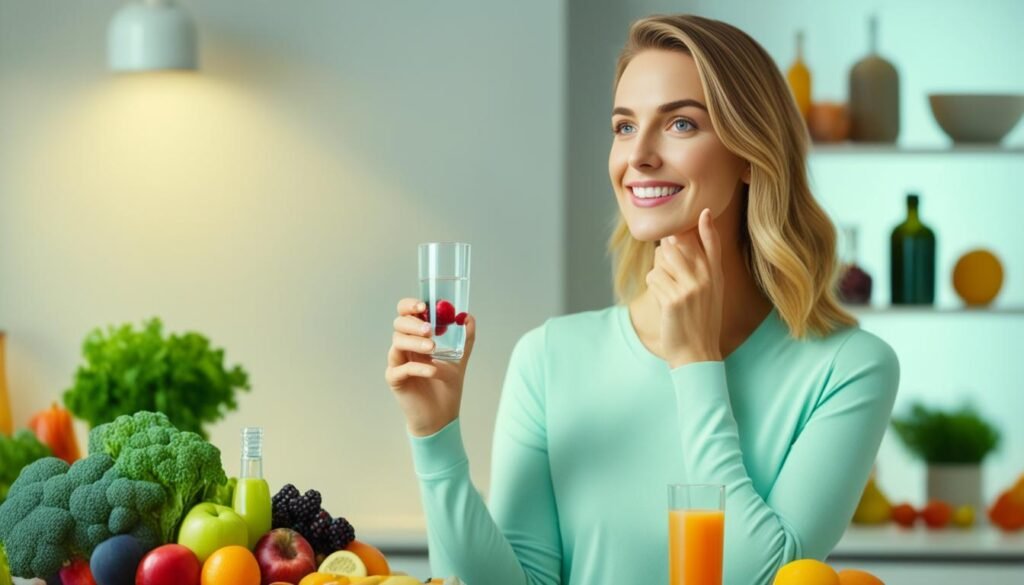
In addition to alcohol consumption, several other factors can contribute to premature skin aging. These factors include:
- Stress
- Smoking
- Poor nutrition
- Lack of sleep
- Excessive sun exposure
By understanding and addressing these factors, it is possible to prevent premature aging and maintain youthful-looking skin. Here are some tips to help:
- Drinking plenty of water to stay hydrated
- Getting enough sleep to allow the skin to repair and regenerate
- Protecting the skin from the sun’s harmful UV rays by wearing sunscreen and protective clothing
- Maintaining a balanced diet rich in antioxidants, vitamins, and minerals
By incorporating these healthy habits into your lifestyle, you can significantly reduce the risk of premature aging and maintain the health and appearance of your skin.
| Factor | Effect on Skin |
|---|---|
| Stress | Produces free radicals that damage collagen and elastin, leading to wrinkles and sagging |
| Smoking | Reduces blood flow, depriving the skin of oxygen and essential nutrients, causing dullness and wrinkles |
| Poor nutrition | Lack of essential vitamins and minerals can impair collagen production and result in dry, dull skin |
| Lack of sleep | Disrupts the natural regeneration process of the skin, leading to increased signs of aging |
| Excessive sun exposure | UV rays accelerate the breakdown of collagen and elastin, causing sunspots, wrinkles, and sagging |
Conclusion
Preventing alcohol-induced skin aging and maintaining healthy skin requires proactive measures and lifestyle changes. Alcohol consumption leads to dehydration, accelerated aging, and various other negative effects on the skin. By cutting down on alcohol, staying hydrated, and adopting a healthy lifestyle, individuals can mitigate these effects and promote youthful-looking skin.
Reducing alcohol intake is crucial as it dehydrates the skin and causes inflammation, leading to visible dehydration, wrinkles, redness, and flushing. Alcohol’s impact on collagen production can further contribute to sagging skin and an older appearance. Moreover, alcohol interferes with the skin’s ability to absorb essential nutrients like vitamin A, resulting in dullness and lack of radiance.
Excessive alcohol consumption can also increase oil production, contributing to acne breakouts, and dilate blood vessels, leading to redness, flushing, and spider veins. Additionally, the high sugar content in many alcoholic drinks can spike insulin levels, promoting collagen breakdown and wrinkles.
To maintain healthy skin and prevent alcohol-induced skin aging, it is important to limit alcohol consumption, drink plenty of water to stay hydrated, and adopt a well-rounded lifestyle that includes a balanced diet, sufficient sleep, and sun protection. Remember, individual skin concerns may vary, so consulting with a healthcare professional or dermatologist can provide personalized advice and treatment.
FAQ
What are the effects of alcohol on the skin?
Alcohol can cause visible dehydration and wrinkles, inflammation leading to redness and flushing, disruption of sleep resulting in a duller complexion and more wrinkles, and worsening of underlying skin conditions such as rosacea and psoriasis.
How does alcohol contribute to skin dehydration and aging?
Alcohol acts as a diuretic, causing increased water and salt loss in the body, leading to skin dehydration. It also decreases collagen production, resulting in decreased elasticity and the appearance of wrinkles.
Can alcohol interfere with vitamin A absorption and cause dullness in the skin?
Yes, alcohol can interfere with the skin’s ability to absorb vitamin A, which is essential for healthy and radiant skin. This interference can result in dullness and a lack of radiance in the skin.
Does alcohol consumption contribute to acne breakouts?
Yes, alcohol can increase oil production in the skin, leading to acne breakouts. Excess sebum production, combined with dead skin cells, dirt, and bacteria, can result in blackheads, whiteheads, and pimples.
Can alcohol cause blood vessel dilation and redness in the skin?
Yes, alcohol causes blood vessels to dilate, leading to redness and flushing of the skin. Excessive alcohol consumption can also cause spider veins or broken capillaries, particularly in areas like the cheeks, nose, and mouth.
Does alcohol consumption contribute to wrinkles and premature skin aging?
Yes, many alcoholic drinks contain high amounts of sugar, which can lead to spikes in insulin levels. High insulin levels can contribute to the breakdown of collagen in the skin and increase the risk of wrinkles.
Are there any other negative effects of alcohol on the skin?
Yes, alcohol can cause or worsen various skin disorders such as flushing, rosacea, psoriasis, and seborrheic dermatitis. It can also increase the risk of sunburn and weaken the immune system, making the skin more susceptible to infections and diseases.
Apart from alcohol, what other factors contribute to premature skin aging?
Factors such as stress, smoking, poor nutrition, lack of sleep, and excessive sun exposure can also contribute to premature skin aging. Practicing healthy habits, including drinking plenty of water, getting enough sleep, protecting the skin from the sun, and maintaining a balanced diet, can help prevent premature aging.
How can I prevent alcohol-induced skin aging and maintain healthy skin?
Cutting down on alcohol consumption, staying hydrated by drinking water in between alcoholic drinks, and practicing a healthy lifestyle can help mitigate the negative effects of alcohol on the skin and maintain healthy, youthful-looking skin.

